International Criminal Court: Complementary Jurisdiction Essay
VerifiedAdded on 2023/01/19
|25
|7898
|86
Essay
AI Summary
This essay provides a comprehensive analysis of the principle of complementary jurisdiction as exercised by the International Criminal Court (ICC). It begins by defining the concept and tracing its origins to the International Criminal Tribunal for the former Yugoslavia (ICTY) and the International Criminal Tribunal for Rwanda (ICTR), highlighting the shift from 'concurrent jurisdiction' to the 'complementary jurisdiction' model established by the Rome Statute. The essay focuses on Article 17 of the Rome Statute, which outlines the conditions under which the ICC can intervene, emphasizing the primary role of states in prosecuting international crimes. It explores the tensions that can arise between state parties and the ICC, using the Libyan cases (Gaddafi and Al Senussi) as examples. The essay critically discusses the jurisprudence, evaluating whether complementary jurisdiction upholds or challenges state sovereignty. The essay also examines the ICC's jurisdiction, including the four core international crimes (genocide, crimes against humanity, war crimes, and crimes of aggression), and the conditions under which the ICC can initiate investigations, including referrals from states, the UN Security Council, or the Prosecutor's own initiative. The essay concludes by emphasizing the importance of cooperation between the ICC and domestic courts to ensure justice and maintain peace.
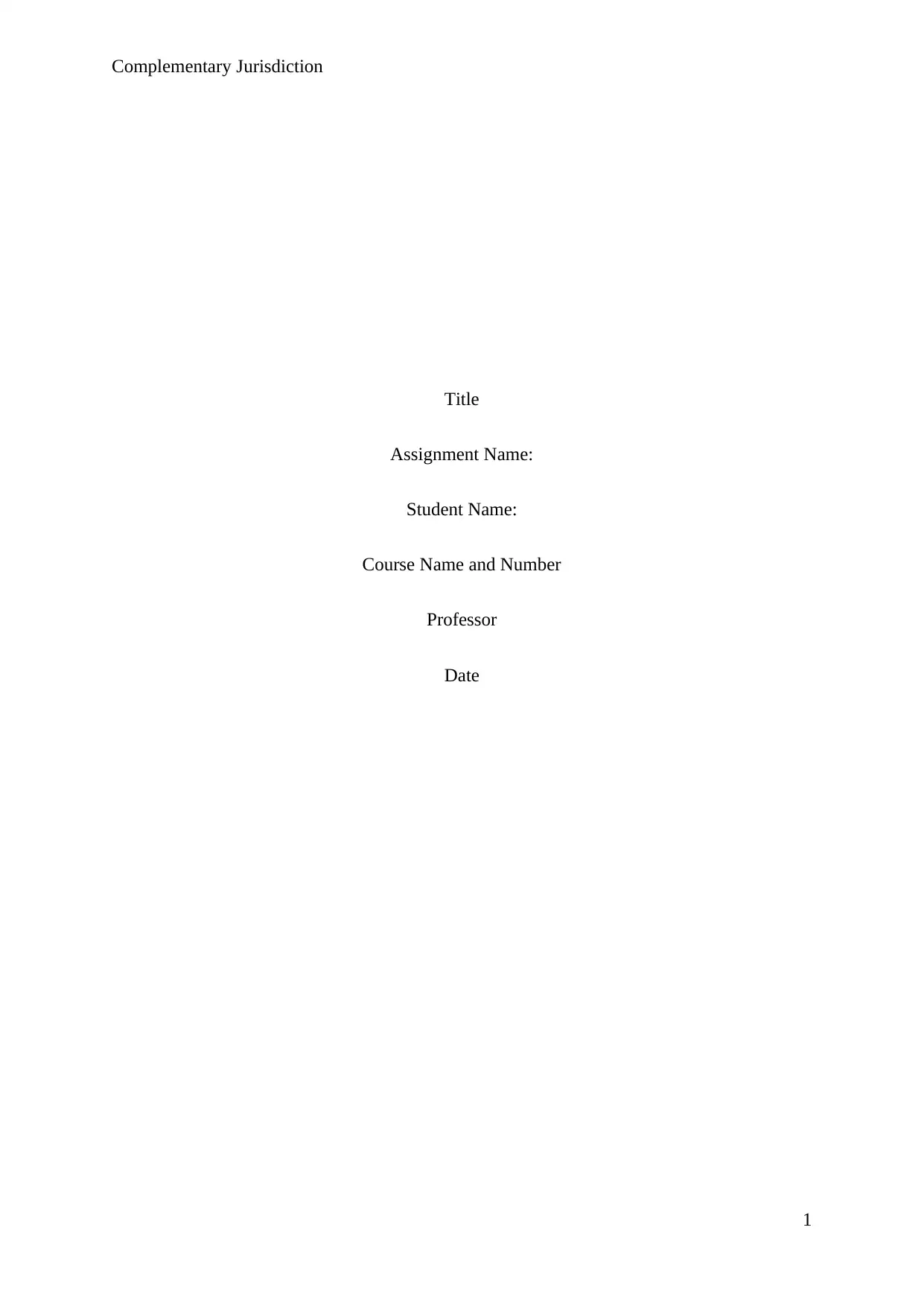
Complementary Jurisdiction
Title
Assignment Name:
Student Name:
Course Name and Number
Professor
Date
1
Title
Assignment Name:
Student Name:
Course Name and Number
Professor
Date
1
Paraphrase This Document
Need a fresh take? Get an instant paraphrase of this document with our AI Paraphraser
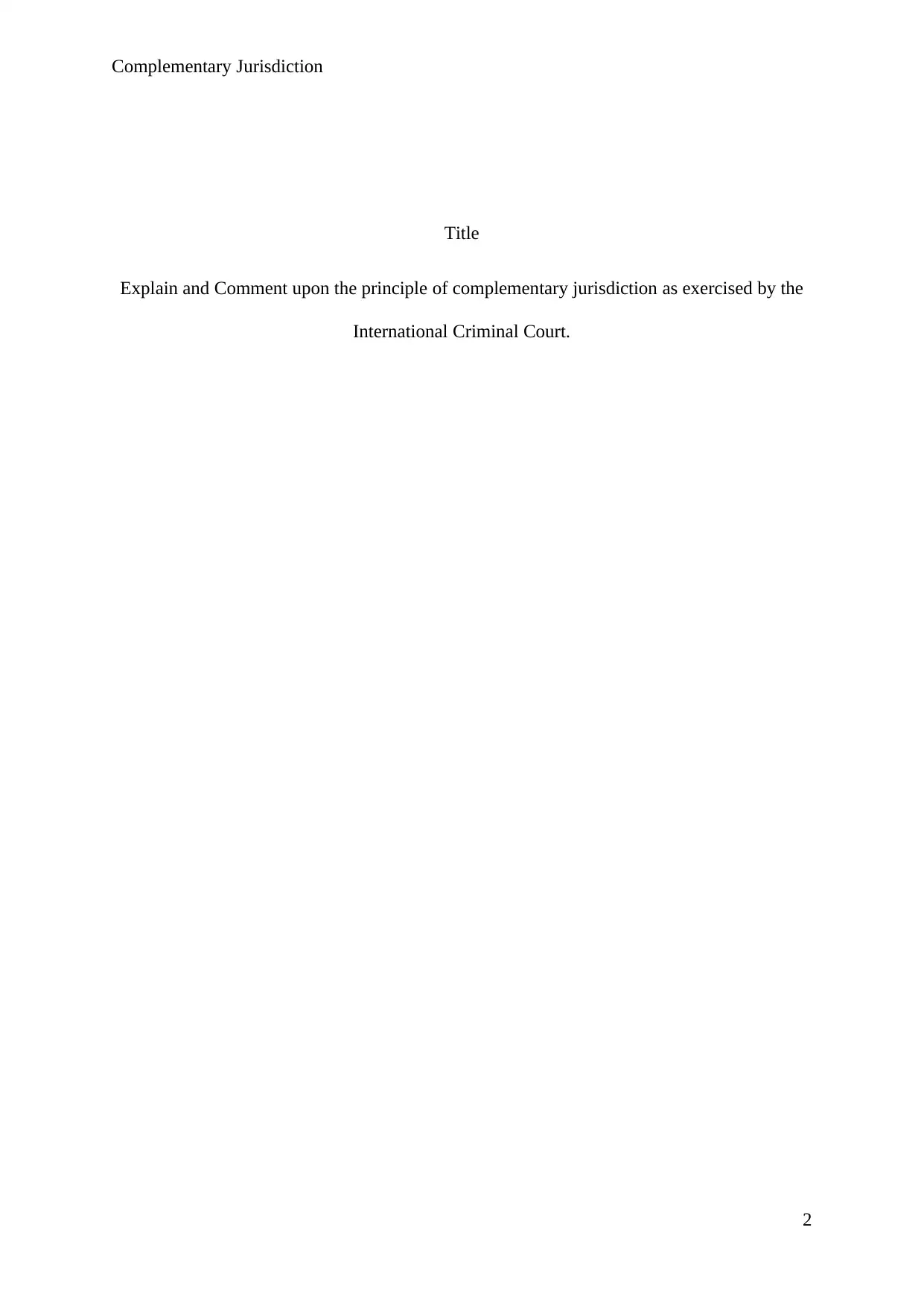
Complementary Jurisdiction
Title
Explain and Comment upon the principle of complementary jurisdiction as exercised by the
International Criminal Court.
2
Title
Explain and Comment upon the principle of complementary jurisdiction as exercised by the
International Criminal Court.
2
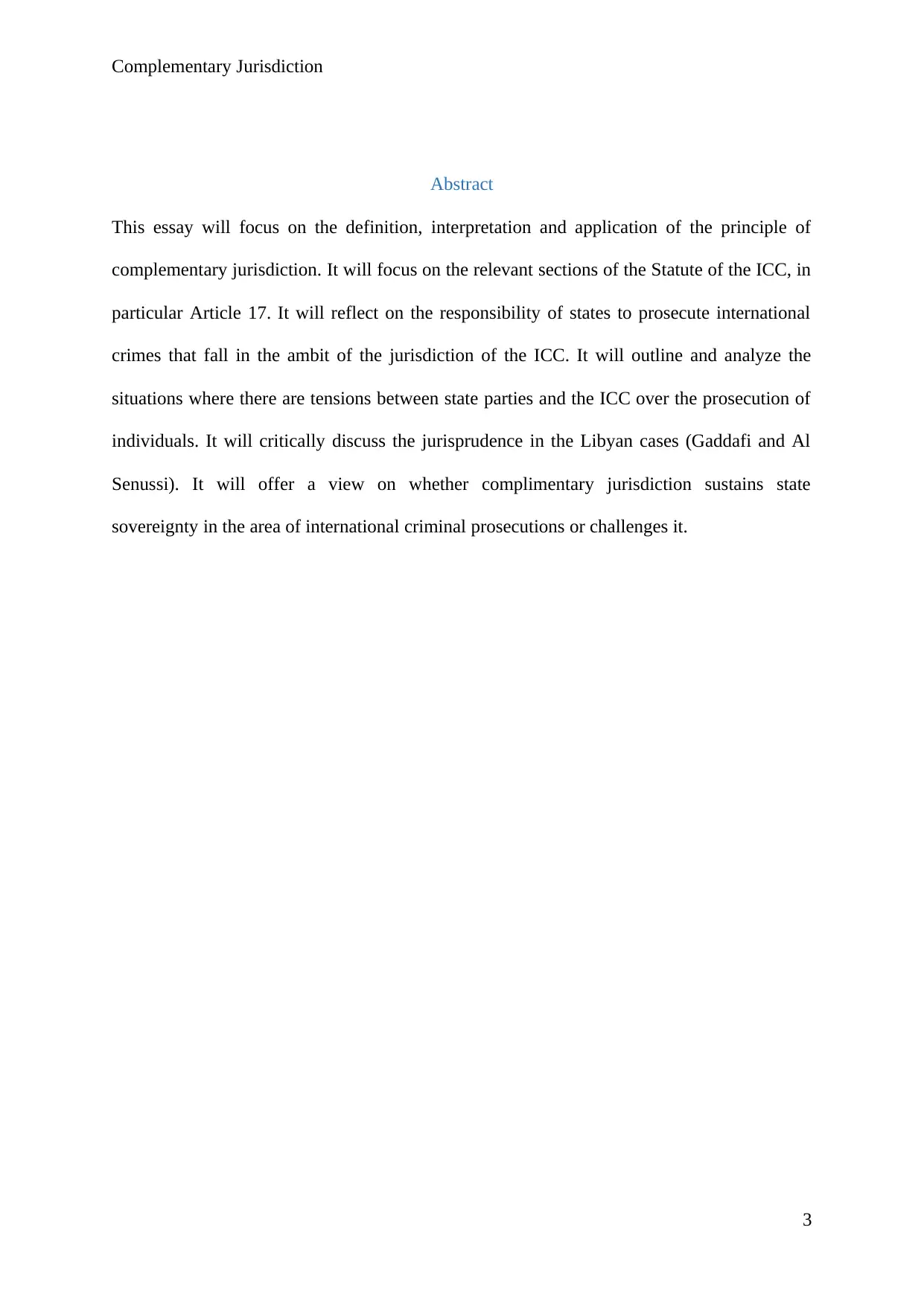
Complementary Jurisdiction
Abstract
This essay will focus on the definition, interpretation and application of the principle of
complementary jurisdiction. It will focus on the relevant sections of the Statute of the ICC, in
particular Article 17. It will reflect on the responsibility of states to prosecute international
crimes that fall in the ambit of the jurisdiction of the ICC. It will outline and analyze the
situations where there are tensions between state parties and the ICC over the prosecution of
individuals. It will critically discuss the jurisprudence in the Libyan cases (Gaddafi and Al
Senussi). It will offer a view on whether complimentary jurisdiction sustains state
sovereignty in the area of international criminal prosecutions or challenges it.
3
Abstract
This essay will focus on the definition, interpretation and application of the principle of
complementary jurisdiction. It will focus on the relevant sections of the Statute of the ICC, in
particular Article 17. It will reflect on the responsibility of states to prosecute international
crimes that fall in the ambit of the jurisdiction of the ICC. It will outline and analyze the
situations where there are tensions between state parties and the ICC over the prosecution of
individuals. It will critically discuss the jurisprudence in the Libyan cases (Gaddafi and Al
Senussi). It will offer a view on whether complimentary jurisdiction sustains state
sovereignty in the area of international criminal prosecutions or challenges it.
3
⊘ This is a preview!⊘
Do you want full access?
Subscribe today to unlock all pages.

Trusted by 1+ million students worldwide
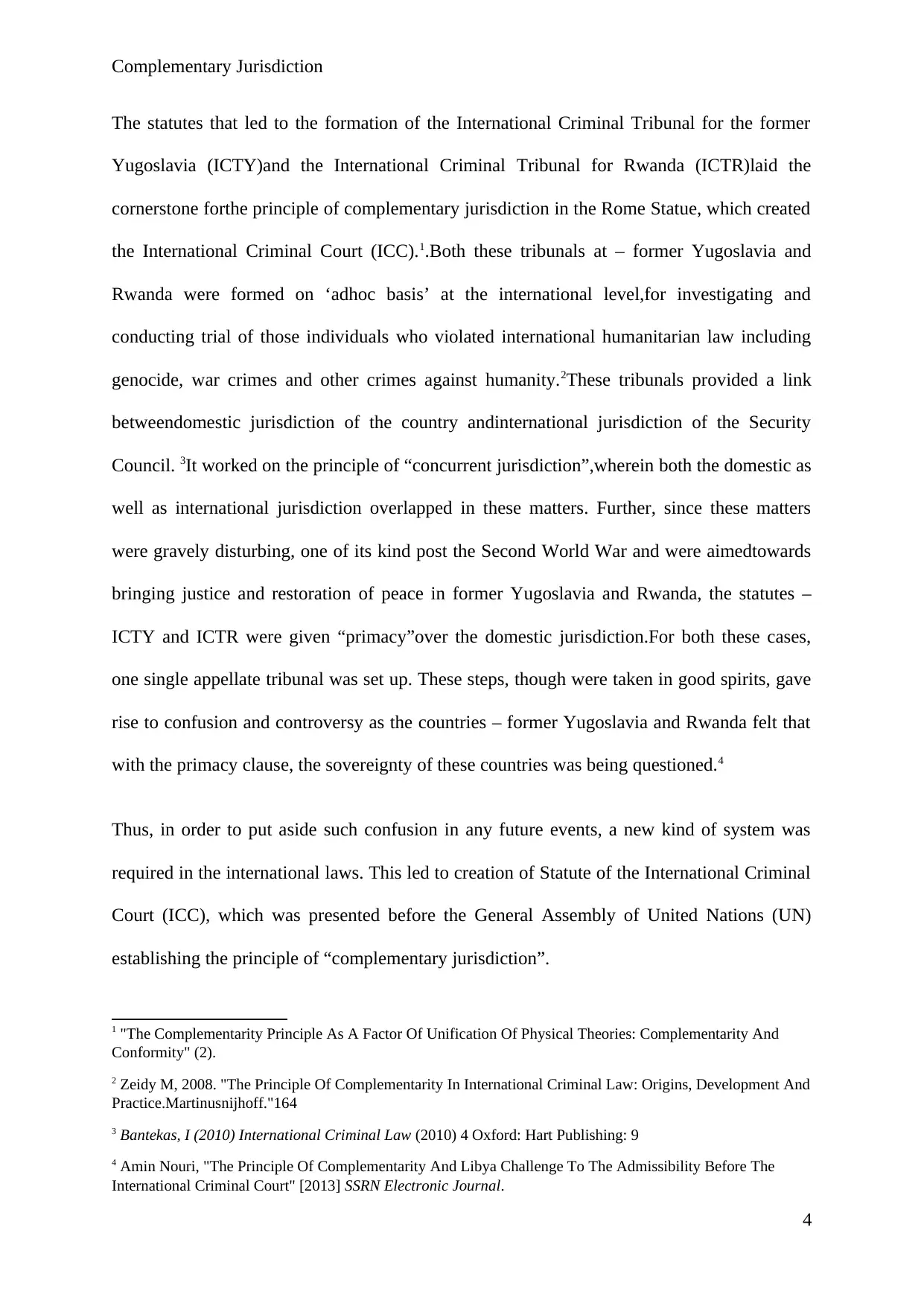
Complementary Jurisdiction
The statutes that led to the formation of the International Criminal Tribunal for the former
Yugoslavia (ICTY)and the International Criminal Tribunal for Rwanda (ICTR)laid the
cornerstone forthe principle of complementary jurisdiction in the Rome Statue, which created
the International Criminal Court (ICC).1.Both these tribunals at – former Yugoslavia and
Rwanda were formed on ‘adhoc basis’ at the international level,for investigating and
conducting trial of those individuals who violated international humanitarian law including
genocide, war crimes and other crimes against humanity.2These tribunals provided a link
betweendomestic jurisdiction of the country andinternational jurisdiction of the Security
Council. 3It worked on the principle of “concurrent jurisdiction”,wherein both the domestic as
well as international jurisdiction overlapped in these matters. Further, since these matters
were gravely disturbing, one of its kind post the Second World War and were aimedtowards
bringing justice and restoration of peace in former Yugoslavia and Rwanda, the statutes –
ICTY and ICTR were given “primacy”over the domestic jurisdiction.For both these cases,
one single appellate tribunal was set up. These steps, though were taken in good spirits, gave
rise to confusion and controversy as the countries – former Yugoslavia and Rwanda felt that
with the primacy clause, the sovereignty of these countries was being questioned.4
Thus, in order to put aside such confusion in any future events, a new kind of system was
required in the international laws. This led to creation of Statute of the International Criminal
Court (ICC), which was presented before the General Assembly of United Nations (UN)
establishing the principle of “complementary jurisdiction”.
1 "The Complementarity Principle As A Factor Of Unification Of Physical Theories: Complementarity And
Conformity" (2).
2 Zeidy M, 2008. "The Principle Of Complementarity In International Criminal Law: Origins, Development And
Practice.Martinusnijhoff."164
3 Bantekas, I (2010) International Criminal Law (2010) 4 Oxford: Hart Publishing: 9
4 Amin Nouri, "The Principle Of Complementarity And Libya Challenge To The Admissibility Before The
International Criminal Court" [2013] SSRN Electronic Journal.
4
The statutes that led to the formation of the International Criminal Tribunal for the former
Yugoslavia (ICTY)and the International Criminal Tribunal for Rwanda (ICTR)laid the
cornerstone forthe principle of complementary jurisdiction in the Rome Statue, which created
the International Criminal Court (ICC).1.Both these tribunals at – former Yugoslavia and
Rwanda were formed on ‘adhoc basis’ at the international level,for investigating and
conducting trial of those individuals who violated international humanitarian law including
genocide, war crimes and other crimes against humanity.2These tribunals provided a link
betweendomestic jurisdiction of the country andinternational jurisdiction of the Security
Council. 3It worked on the principle of “concurrent jurisdiction”,wherein both the domestic as
well as international jurisdiction overlapped in these matters. Further, since these matters
were gravely disturbing, one of its kind post the Second World War and were aimedtowards
bringing justice and restoration of peace in former Yugoslavia and Rwanda, the statutes –
ICTY and ICTR were given “primacy”over the domestic jurisdiction.For both these cases,
one single appellate tribunal was set up. These steps, though were taken in good spirits, gave
rise to confusion and controversy as the countries – former Yugoslavia and Rwanda felt that
with the primacy clause, the sovereignty of these countries was being questioned.4
Thus, in order to put aside such confusion in any future events, a new kind of system was
required in the international laws. This led to creation of Statute of the International Criminal
Court (ICC), which was presented before the General Assembly of United Nations (UN)
establishing the principle of “complementary jurisdiction”.
1 "The Complementarity Principle As A Factor Of Unification Of Physical Theories: Complementarity And
Conformity" (2).
2 Zeidy M, 2008. "The Principle Of Complementarity In International Criminal Law: Origins, Development And
Practice.Martinusnijhoff."164
3 Bantekas, I (2010) International Criminal Law (2010) 4 Oxford: Hart Publishing: 9
4 Amin Nouri, "The Principle Of Complementarity And Libya Challenge To The Admissibility Before The
International Criminal Court" [2013] SSRN Electronic Journal.
4
Paraphrase This Document
Need a fresh take? Get an instant paraphrase of this document with our AI Paraphraser
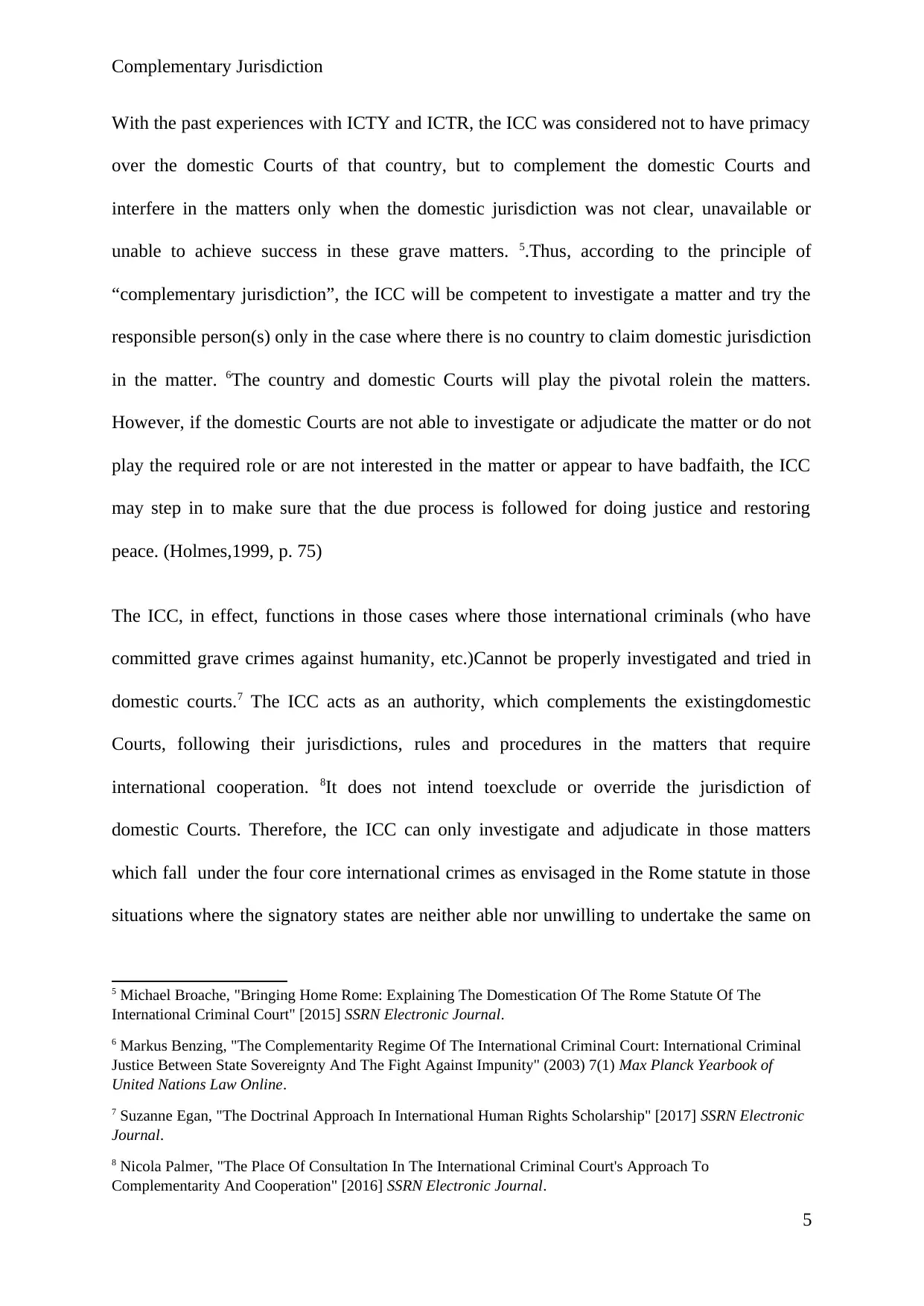
Complementary Jurisdiction
With the past experiences with ICTY and ICTR, the ICC was considered not to have primacy
over the domestic Courts of that country, but to complement the domestic Courts and
interfere in the matters only when the domestic jurisdiction was not clear, unavailable or
unable to achieve success in these grave matters. 5.Thus, according to the principle of
“complementary jurisdiction”, the ICC will be competent to investigate a matter and try the
responsible person(s) only in the case where there is no country to claim domestic jurisdiction
in the matter. 6The country and domestic Courts will play the pivotal rolein the matters.
However, if the domestic Courts are not able to investigate or adjudicate the matter or do not
play the required role or are not interested in the matter or appear to have badfaith, the ICC
may step in to make sure that the due process is followed for doing justice and restoring
peace. (Holmes,1999, p. 75)
The ICC, in effect, functions in those cases where those international criminals (who have
committed grave crimes against humanity, etc.)Cannot be properly investigated and tried in
domestic courts.7 The ICC acts as an authority, which complements the existingdomestic
Courts, following their jurisdictions, rules and procedures in the matters that require
international cooperation. 8It does not intend toexclude or override the jurisdiction of
domestic Courts. Therefore, the ICC can only investigate and adjudicate in those matters
which fall under the four core international crimes as envisaged in the Rome statute in those
situations where the signatory states are neither able nor unwilling to undertake the same on
5 Michael Broache, "Bringing Home Rome: Explaining The Domestication Of The Rome Statute Of The
International Criminal Court" [2015] SSRN Electronic Journal.
6 Markus Benzing, "The Complementarity Regime Of The International Criminal Court: International Criminal
Justice Between State Sovereignty And The Fight Against Impunity" (2003) 7(1) Max Planck Yearbook of
United Nations Law Online.
7 Suzanne Egan, "The Doctrinal Approach In International Human Rights Scholarship" [2017] SSRN Electronic
Journal.
8 Nicola Palmer, "The Place Of Consultation In The International Criminal Court's Approach To
Complementarity And Cooperation" [2016] SSRN Electronic Journal.
5
With the past experiences with ICTY and ICTR, the ICC was considered not to have primacy
over the domestic Courts of that country, but to complement the domestic Courts and
interfere in the matters only when the domestic jurisdiction was not clear, unavailable or
unable to achieve success in these grave matters. 5.Thus, according to the principle of
“complementary jurisdiction”, the ICC will be competent to investigate a matter and try the
responsible person(s) only in the case where there is no country to claim domestic jurisdiction
in the matter. 6The country and domestic Courts will play the pivotal rolein the matters.
However, if the domestic Courts are not able to investigate or adjudicate the matter or do not
play the required role or are not interested in the matter or appear to have badfaith, the ICC
may step in to make sure that the due process is followed for doing justice and restoring
peace. (Holmes,1999, p. 75)
The ICC, in effect, functions in those cases where those international criminals (who have
committed grave crimes against humanity, etc.)Cannot be properly investigated and tried in
domestic courts.7 The ICC acts as an authority, which complements the existingdomestic
Courts, following their jurisdictions, rules and procedures in the matters that require
international cooperation. 8It does not intend toexclude or override the jurisdiction of
domestic Courts. Therefore, the ICC can only investigate and adjudicate in those matters
which fall under the four core international crimes as envisaged in the Rome statute in those
situations where the signatory states are neither able nor unwilling to undertake the same on
5 Michael Broache, "Bringing Home Rome: Explaining The Domestication Of The Rome Statute Of The
International Criminal Court" [2015] SSRN Electronic Journal.
6 Markus Benzing, "The Complementarity Regime Of The International Criminal Court: International Criminal
Justice Between State Sovereignty And The Fight Against Impunity" (2003) 7(1) Max Planck Yearbook of
United Nations Law Online.
7 Suzanne Egan, "The Doctrinal Approach In International Human Rights Scholarship" [2017] SSRN Electronic
Journal.
8 Nicola Palmer, "The Place Of Consultation In The International Criminal Court's Approach To
Complementarity And Cooperation" [2016] SSRN Electronic Journal.
5
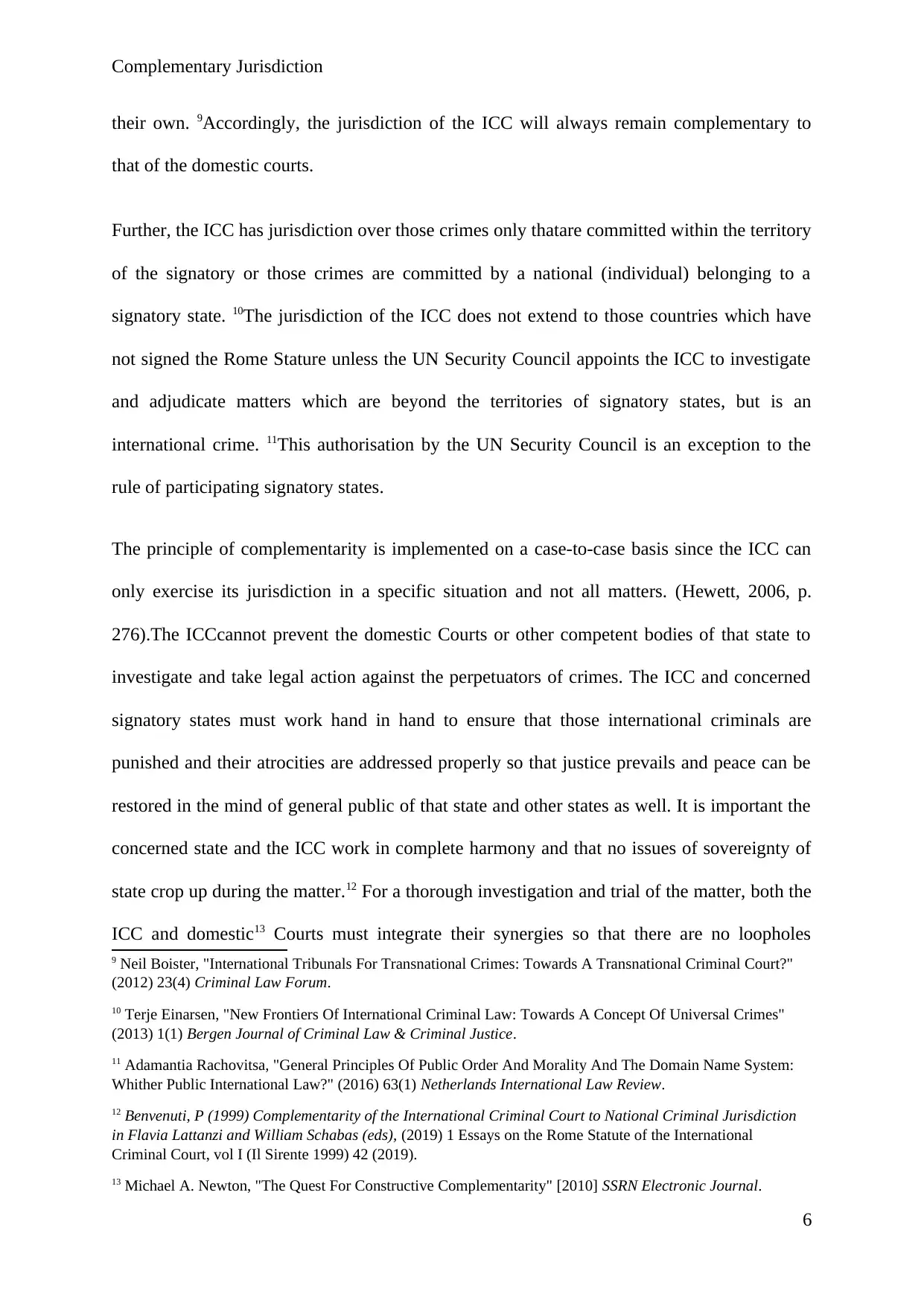
Complementary Jurisdiction
their own. 9Accordingly, the jurisdiction of the ICC will always remain complementary to
that of the domestic courts.
Further, the ICC has jurisdiction over those crimes only thatare committed within the territory
of the signatory or those crimes are committed by a national (individual) belonging to a
signatory state. 10The jurisdiction of the ICC does not extend to those countries which have
not signed the Rome Stature unless the UN Security Council appoints the ICC to investigate
and adjudicate matters which are beyond the territories of signatory states, but is an
international crime. 11This authorisation by the UN Security Council is an exception to the
rule of participating signatory states.
The principle of complementarity is implemented on a case-to-case basis since the ICC can
only exercise its jurisdiction in a specific situation and not all matters. (Hewett, 2006, p.
276).The ICCcannot prevent the domestic Courts or other competent bodies of that state to
investigate and take legal action against the perpetuators of crimes. The ICC and concerned
signatory states must work hand in hand to ensure that those international criminals are
punished and their atrocities are addressed properly so that justice prevails and peace can be
restored in the mind of general public of that state and other states as well. It is important the
concerned state and the ICC work in complete harmony and that no issues of sovereignty of
state crop up during the matter.12 For a thorough investigation and trial of the matter, both the
ICC and domestic13 Courts must integrate their synergies so that there are no loopholes
9 Neil Boister, "International Tribunals For Transnational Crimes: Towards A Transnational Criminal Court?"
(2012) 23(4) Criminal Law Forum.
10 Terje Einarsen, "New Frontiers Of International Criminal Law: Towards A Concept Of Universal Crimes"
(2013) 1(1) Bergen Journal of Criminal Law & Criminal Justice.
11 Adamantia Rachovitsa, "General Principles Of Public Order And Morality And The Domain Name System:
Whither Public International Law?" (2016) 63(1) Netherlands International Law Review.
12 Benvenuti, P (1999) Complementarity of the International Criminal Court to National Criminal Jurisdiction
in Flavia Lattanzi and William Schabas (eds), (2019) 1 Essays on the Rome Statute of the International
Criminal Court, vol I (Il Sirente 1999) 42 (2019).
13 Michael A. Newton, "The Quest For Constructive Complementarity" [2010] SSRN Electronic Journal.
6
their own. 9Accordingly, the jurisdiction of the ICC will always remain complementary to
that of the domestic courts.
Further, the ICC has jurisdiction over those crimes only thatare committed within the territory
of the signatory or those crimes are committed by a national (individual) belonging to a
signatory state. 10The jurisdiction of the ICC does not extend to those countries which have
not signed the Rome Stature unless the UN Security Council appoints the ICC to investigate
and adjudicate matters which are beyond the territories of signatory states, but is an
international crime. 11This authorisation by the UN Security Council is an exception to the
rule of participating signatory states.
The principle of complementarity is implemented on a case-to-case basis since the ICC can
only exercise its jurisdiction in a specific situation and not all matters. (Hewett, 2006, p.
276).The ICCcannot prevent the domestic Courts or other competent bodies of that state to
investigate and take legal action against the perpetuators of crimes. The ICC and concerned
signatory states must work hand in hand to ensure that those international criminals are
punished and their atrocities are addressed properly so that justice prevails and peace can be
restored in the mind of general public of that state and other states as well. It is important the
concerned state and the ICC work in complete harmony and that no issues of sovereignty of
state crop up during the matter.12 For a thorough investigation and trial of the matter, both the
ICC and domestic13 Courts must integrate their synergies so that there are no loopholes
9 Neil Boister, "International Tribunals For Transnational Crimes: Towards A Transnational Criminal Court?"
(2012) 23(4) Criminal Law Forum.
10 Terje Einarsen, "New Frontiers Of International Criminal Law: Towards A Concept Of Universal Crimes"
(2013) 1(1) Bergen Journal of Criminal Law & Criminal Justice.
11 Adamantia Rachovitsa, "General Principles Of Public Order And Morality And The Domain Name System:
Whither Public International Law?" (2016) 63(1) Netherlands International Law Review.
12 Benvenuti, P (1999) Complementarity of the International Criminal Court to National Criminal Jurisdiction
in Flavia Lattanzi and William Schabas (eds), (2019) 1 Essays on the Rome Statute of the International
Criminal Court, vol I (Il Sirente 1999) 42 (2019).
13 Michael A. Newton, "The Quest For Constructive Complementarity" [2010] SSRN Electronic Journal.
6
⊘ This is a preview!⊘
Do you want full access?
Subscribe today to unlock all pages.

Trusted by 1+ million students worldwide
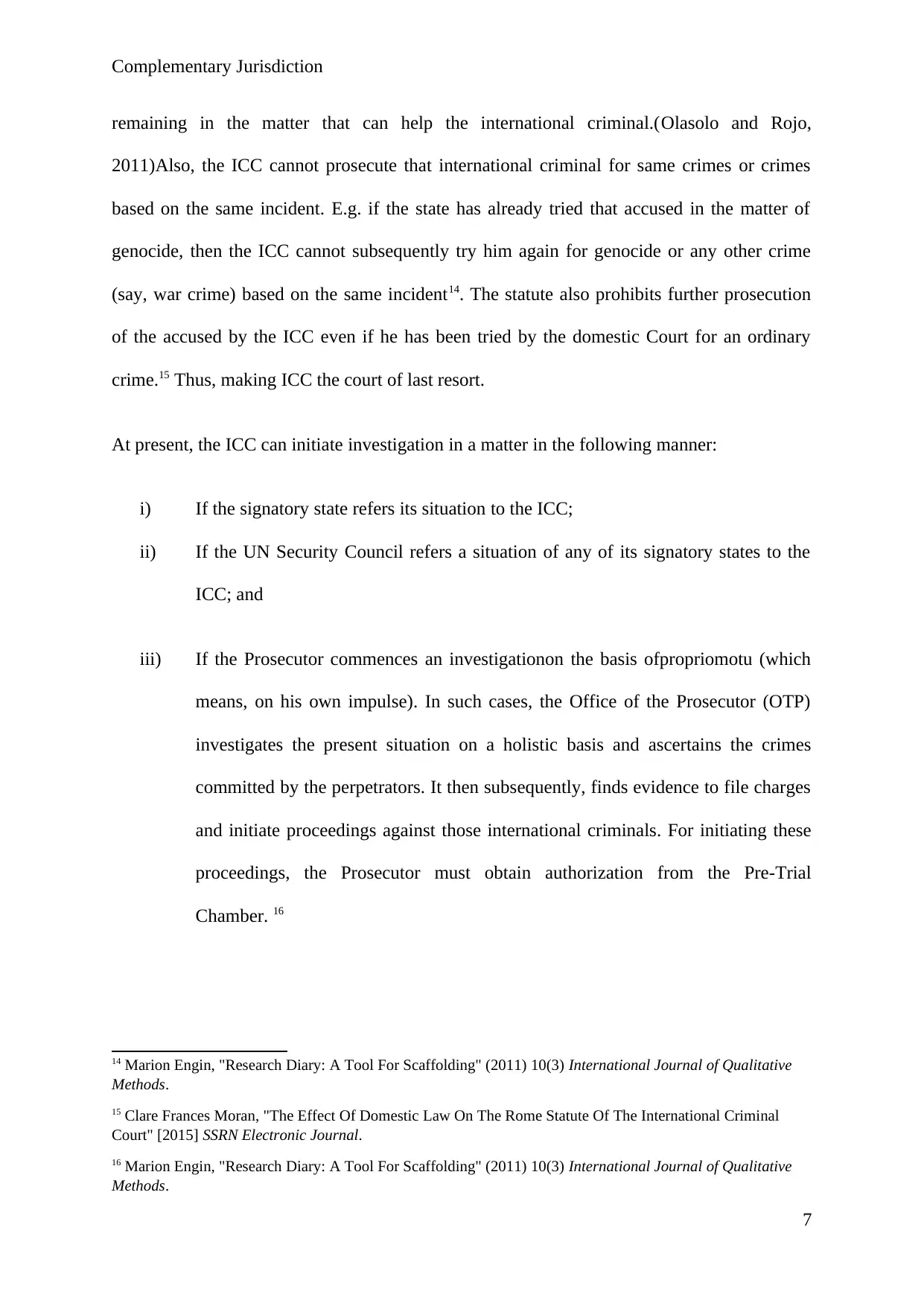
Complementary Jurisdiction
remaining in the matter that can help the international criminal.(Olasolo and Rojo,
2011)Also, the ICC cannot prosecute that international criminal for same crimes or crimes
based on the same incident. E.g. if the state has already tried that accused in the matter of
genocide, then the ICC cannot subsequently try him again for genocide or any other crime
(say, war crime) based on the same incident14. The statute also prohibits further prosecution
of the accused by the ICC even if he has been tried by the domestic Court for an ordinary
crime.15 Thus, making ICC the court of last resort.
At present, the ICC can initiate investigation in a matter in the following manner:
i) If the signatory state refers its situation to the ICC;
ii) If the UN Security Council refers a situation of any of its signatory states to the
ICC; and
iii) If the Prosecutor commences an investigationon the basis ofpropriomotu (which
means, on his own impulse). In such cases, the Office of the Prosecutor (OTP)
investigates the present situation on a holistic basis and ascertains the crimes
committed by the perpetrators. It then subsequently, finds evidence to file charges
and initiate proceedings against those international criminals. For initiating these
proceedings, the Prosecutor must obtain authorization from the Pre-Trial
Chamber. 16
14 Marion Engin, "Research Diary: A Tool For Scaffolding" (2011) 10(3) International Journal of Qualitative
Methods.
15 Clare Frances Moran, "The Effect Of Domestic Law On The Rome Statute Of The International Criminal
Court" [2015] SSRN Electronic Journal.
16 Marion Engin, "Research Diary: A Tool For Scaffolding" (2011) 10(3) International Journal of Qualitative
Methods.
7
remaining in the matter that can help the international criminal.(Olasolo and Rojo,
2011)Also, the ICC cannot prosecute that international criminal for same crimes or crimes
based on the same incident. E.g. if the state has already tried that accused in the matter of
genocide, then the ICC cannot subsequently try him again for genocide or any other crime
(say, war crime) based on the same incident14. The statute also prohibits further prosecution
of the accused by the ICC even if he has been tried by the domestic Court for an ordinary
crime.15 Thus, making ICC the court of last resort.
At present, the ICC can initiate investigation in a matter in the following manner:
i) If the signatory state refers its situation to the ICC;
ii) If the UN Security Council refers a situation of any of its signatory states to the
ICC; and
iii) If the Prosecutor commences an investigationon the basis ofpropriomotu (which
means, on his own impulse). In such cases, the Office of the Prosecutor (OTP)
investigates the present situation on a holistic basis and ascertains the crimes
committed by the perpetrators. It then subsequently, finds evidence to file charges
and initiate proceedings against those international criminals. For initiating these
proceedings, the Prosecutor must obtain authorization from the Pre-Trial
Chamber. 16
14 Marion Engin, "Research Diary: A Tool For Scaffolding" (2011) 10(3) International Journal of Qualitative
Methods.
15 Clare Frances Moran, "The Effect Of Domestic Law On The Rome Statute Of The International Criminal
Court" [2015] SSRN Electronic Journal.
16 Marion Engin, "Research Diary: A Tool For Scaffolding" (2011) 10(3) International Journal of Qualitative
Methods.
7
Paraphrase This Document
Need a fresh take? Get an instant paraphrase of this document with our AI Paraphraser
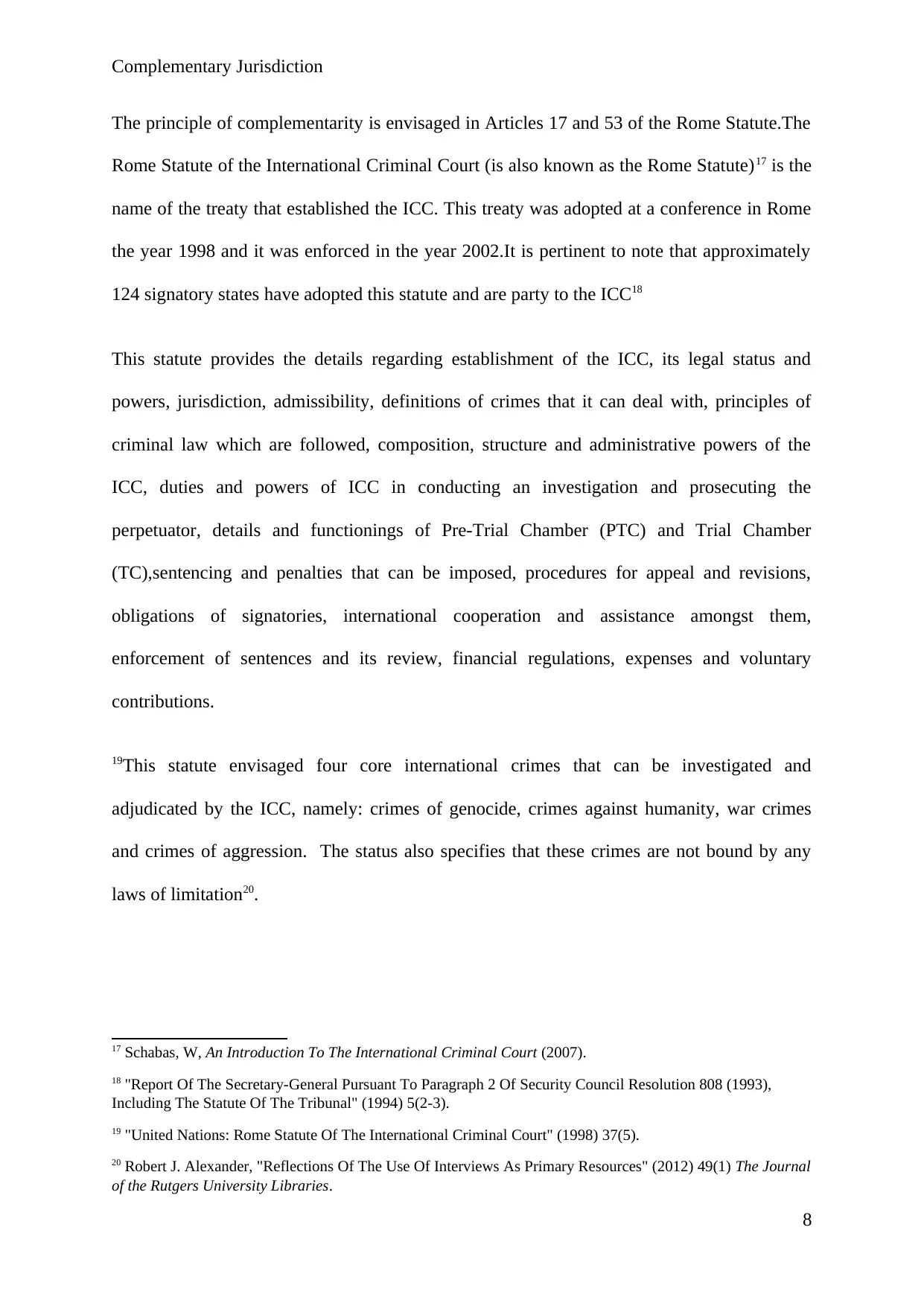
Complementary Jurisdiction
The principle of complementarity is envisaged in Articles 17 and 53 of the Rome Statute.The
Rome Statute of the International Criminal Court (is also known as the Rome Statute)17 is the
name of the treaty that established the ICC. This treaty was adopted at a conference in Rome
the year 1998 and it was enforced in the year 2002.It is pertinent to note that approximately
124 signatory states have adopted this statute and are party to the ICC18
This statute provides the details regarding establishment of the ICC, its legal status and
powers, jurisdiction, admissibility, definitions of crimes that it can deal with, principles of
criminal law which are followed, composition, structure and administrative powers of the
ICC, duties and powers of ICC in conducting an investigation and prosecuting the
perpetuator, details and functionings of Pre-Trial Chamber (PTC) and Trial Chamber
(TC),sentencing and penalties that can be imposed, procedures for appeal and revisions,
obligations of signatories, international cooperation and assistance amongst them,
enforcement of sentences and its review, financial regulations, expenses and voluntary
contributions.
19This statute envisaged four core international crimes that can be investigated and
adjudicated by the ICC, namely: crimes of genocide, crimes against humanity, war crimes
and crimes of aggression. The status also specifies that these crimes are not bound by any
laws of limitation20.
17 Schabas, W, An Introduction To The International Criminal Court (2007).
18 "Report Of The Secretary-General Pursuant To Paragraph 2 Of Security Council Resolution 808 (1993),
Including The Statute Of The Tribunal" (1994) 5(2-3).
19 "United Nations: Rome Statute Of The International Criminal Court" (1998) 37(5).
20 Robert J. Alexander, "Reflections Of The Use Of Interviews As Primary Resources" (2012) 49(1) The Journal
of the Rutgers University Libraries.
8
The principle of complementarity is envisaged in Articles 17 and 53 of the Rome Statute.The
Rome Statute of the International Criminal Court (is also known as the Rome Statute)17 is the
name of the treaty that established the ICC. This treaty was adopted at a conference in Rome
the year 1998 and it was enforced in the year 2002.It is pertinent to note that approximately
124 signatory states have adopted this statute and are party to the ICC18
This statute provides the details regarding establishment of the ICC, its legal status and
powers, jurisdiction, admissibility, definitions of crimes that it can deal with, principles of
criminal law which are followed, composition, structure and administrative powers of the
ICC, duties and powers of ICC in conducting an investigation and prosecuting the
perpetuator, details and functionings of Pre-Trial Chamber (PTC) and Trial Chamber
(TC),sentencing and penalties that can be imposed, procedures for appeal and revisions,
obligations of signatories, international cooperation and assistance amongst them,
enforcement of sentences and its review, financial regulations, expenses and voluntary
contributions.
19This statute envisaged four core international crimes that can be investigated and
adjudicated by the ICC, namely: crimes of genocide, crimes against humanity, war crimes
and crimes of aggression. The status also specifies that these crimes are not bound by any
laws of limitation20.
17 Schabas, W, An Introduction To The International Criminal Court (2007).
18 "Report Of The Secretary-General Pursuant To Paragraph 2 Of Security Council Resolution 808 (1993),
Including The Statute Of The Tribunal" (1994) 5(2-3).
19 "United Nations: Rome Statute Of The International Criminal Court" (1998) 37(5).
20 Robert J. Alexander, "Reflections Of The Use Of Interviews As Primary Resources" (2012) 49(1) The Journal
of the Rutgers University Libraries.
8
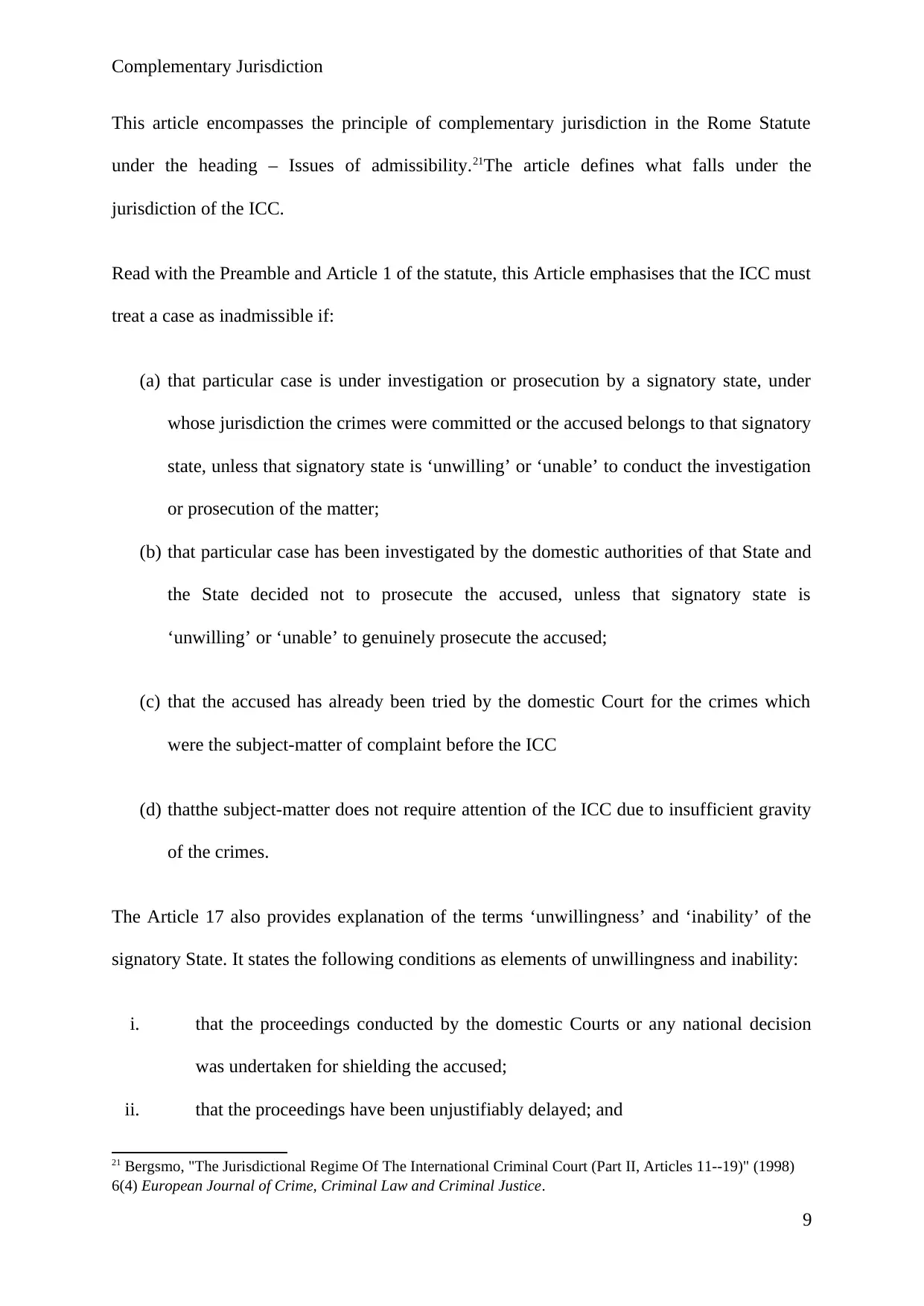
Complementary Jurisdiction
This article encompasses the principle of complementary jurisdiction in the Rome Statute
under the heading – Issues of admissibility.21The article defines what falls under the
jurisdiction of the ICC.
Read with the Preamble and Article 1 of the statute, this Article emphasises that the ICC must
treat a case as inadmissible if:
(a) that particular case is under investigation or prosecution by a signatory state, under
whose jurisdiction the crimes were committed or the accused belongs to that signatory
state, unless that signatory state is ‘unwilling’ or ‘unable’ to conduct the investigation
or prosecution of the matter;
(b) that particular case has been investigated by the domestic authorities of that State and
the State decided not to prosecute the accused, unless that signatory state is
‘unwilling’ or ‘unable’ to genuinely prosecute the accused;
(c) that the accused has already been tried by the domestic Court for the crimes which
were the subject-matter of complaint before the ICC
(d) thatthe subject-matter does not require attention of the ICC due to insufficient gravity
of the crimes.
The Article 17 also provides explanation of the terms ‘unwillingness’ and ‘inability’ of the
signatory State. It states the following conditions as elements of unwillingness and inability:
i. that the proceedings conducted by the domestic Courts or any national decision
was undertaken for shielding the accused;
ii. that the proceedings have been unjustifiably delayed; and
21 Bergsmo, "The Jurisdictional Regime Of The International Criminal Court (Part II, Articles 11--19)" (1998)
6(4) European Journal of Crime, Criminal Law and Criminal Justice.
9
This article encompasses the principle of complementary jurisdiction in the Rome Statute
under the heading – Issues of admissibility.21The article defines what falls under the
jurisdiction of the ICC.
Read with the Preamble and Article 1 of the statute, this Article emphasises that the ICC must
treat a case as inadmissible if:
(a) that particular case is under investigation or prosecution by a signatory state, under
whose jurisdiction the crimes were committed or the accused belongs to that signatory
state, unless that signatory state is ‘unwilling’ or ‘unable’ to conduct the investigation
or prosecution of the matter;
(b) that particular case has been investigated by the domestic authorities of that State and
the State decided not to prosecute the accused, unless that signatory state is
‘unwilling’ or ‘unable’ to genuinely prosecute the accused;
(c) that the accused has already been tried by the domestic Court for the crimes which
were the subject-matter of complaint before the ICC
(d) thatthe subject-matter does not require attention of the ICC due to insufficient gravity
of the crimes.
The Article 17 also provides explanation of the terms ‘unwillingness’ and ‘inability’ of the
signatory State. It states the following conditions as elements of unwillingness and inability:
i. that the proceedings conducted by the domestic Courts or any national decision
was undertaken for shielding the accused;
ii. that the proceedings have been unjustifiably delayed; and
21 Bergsmo, "The Jurisdictional Regime Of The International Criminal Court (Part II, Articles 11--19)" (1998)
6(4) European Journal of Crime, Criminal Law and Criminal Justice.
9
⊘ This is a preview!⊘
Do you want full access?
Subscribe today to unlock all pages.

Trusted by 1+ million students worldwide
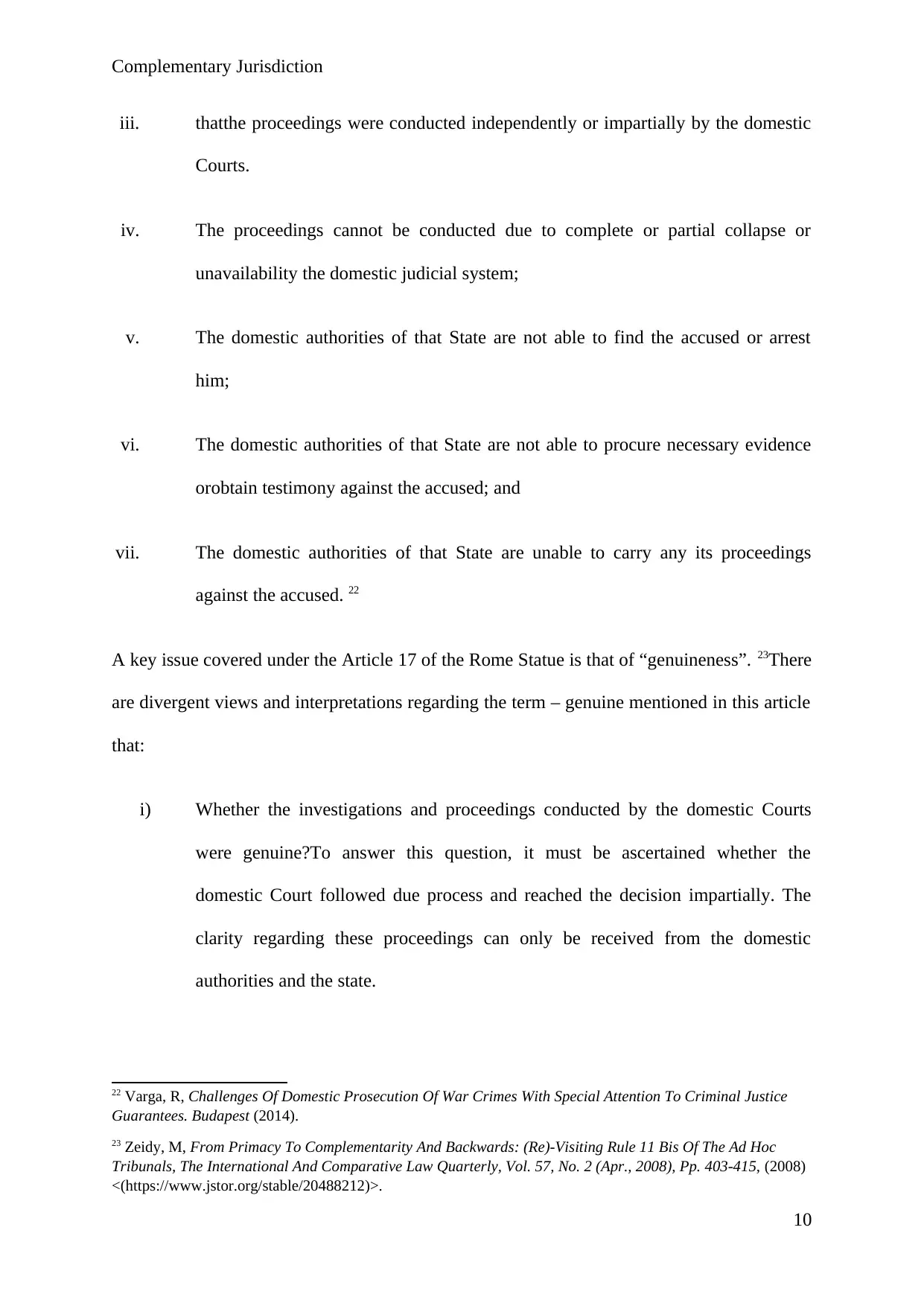
Complementary Jurisdiction
iii. thatthe proceedings were conducted independently or impartially by the domestic
Courts.
iv. The proceedings cannot be conducted due to complete or partial collapse or
unavailability the domestic judicial system;
v. The domestic authorities of that State are not able to find the accused or arrest
him;
vi. The domestic authorities of that State are not able to procure necessary evidence
orobtain testimony against the accused; and
vii. The domestic authorities of that State are unable to carry any its proceedings
against the accused. 22
A key issue covered under the Article 17 of the Rome Statue is that of “genuineness”. 23There
are divergent views and interpretations regarding the term – genuine mentioned in this article
that:
i) Whether the investigations and proceedings conducted by the domestic Courts
were genuine?To answer this question, it must be ascertained whether the
domestic Court followed due process and reached the decision impartially. The
clarity regarding these proceedings can only be received from the domestic
authorities and the state.
22 Varga, R, Challenges Of Domestic Prosecution Of War Crimes With Special Attention To Criminal Justice
Guarantees. Budapest (2014).
23 Zeidy, M, From Primacy To Complementarity And Backwards: (Re)-Visiting Rule 11 Bis Of The Ad Hoc
Tribunals, The International And Comparative Law Quarterly, Vol. 57, No. 2 (Apr., 2008), Pp. 403-415, (2008)
<(https://www.jstor.org/stable/20488212)>.
10
iii. thatthe proceedings were conducted independently or impartially by the domestic
Courts.
iv. The proceedings cannot be conducted due to complete or partial collapse or
unavailability the domestic judicial system;
v. The domestic authorities of that State are not able to find the accused or arrest
him;
vi. The domestic authorities of that State are not able to procure necessary evidence
orobtain testimony against the accused; and
vii. The domestic authorities of that State are unable to carry any its proceedings
against the accused. 22
A key issue covered under the Article 17 of the Rome Statue is that of “genuineness”. 23There
are divergent views and interpretations regarding the term – genuine mentioned in this article
that:
i) Whether the investigations and proceedings conducted by the domestic Courts
were genuine?To answer this question, it must be ascertained whether the
domestic Court followed due process and reached the decision impartially. The
clarity regarding these proceedings can only be received from the domestic
authorities and the state.
22 Varga, R, Challenges Of Domestic Prosecution Of War Crimes With Special Attention To Criminal Justice
Guarantees. Budapest (2014).
23 Zeidy, M, From Primacy To Complementarity And Backwards: (Re)-Visiting Rule 11 Bis Of The Ad Hoc
Tribunals, The International And Comparative Law Quarterly, Vol. 57, No. 2 (Apr., 2008), Pp. 403-415, (2008)
<(https://www.jstor.org/stable/20488212)>.
10
Paraphrase This Document
Need a fresh take? Get an instant paraphrase of this document with our AI Paraphraser
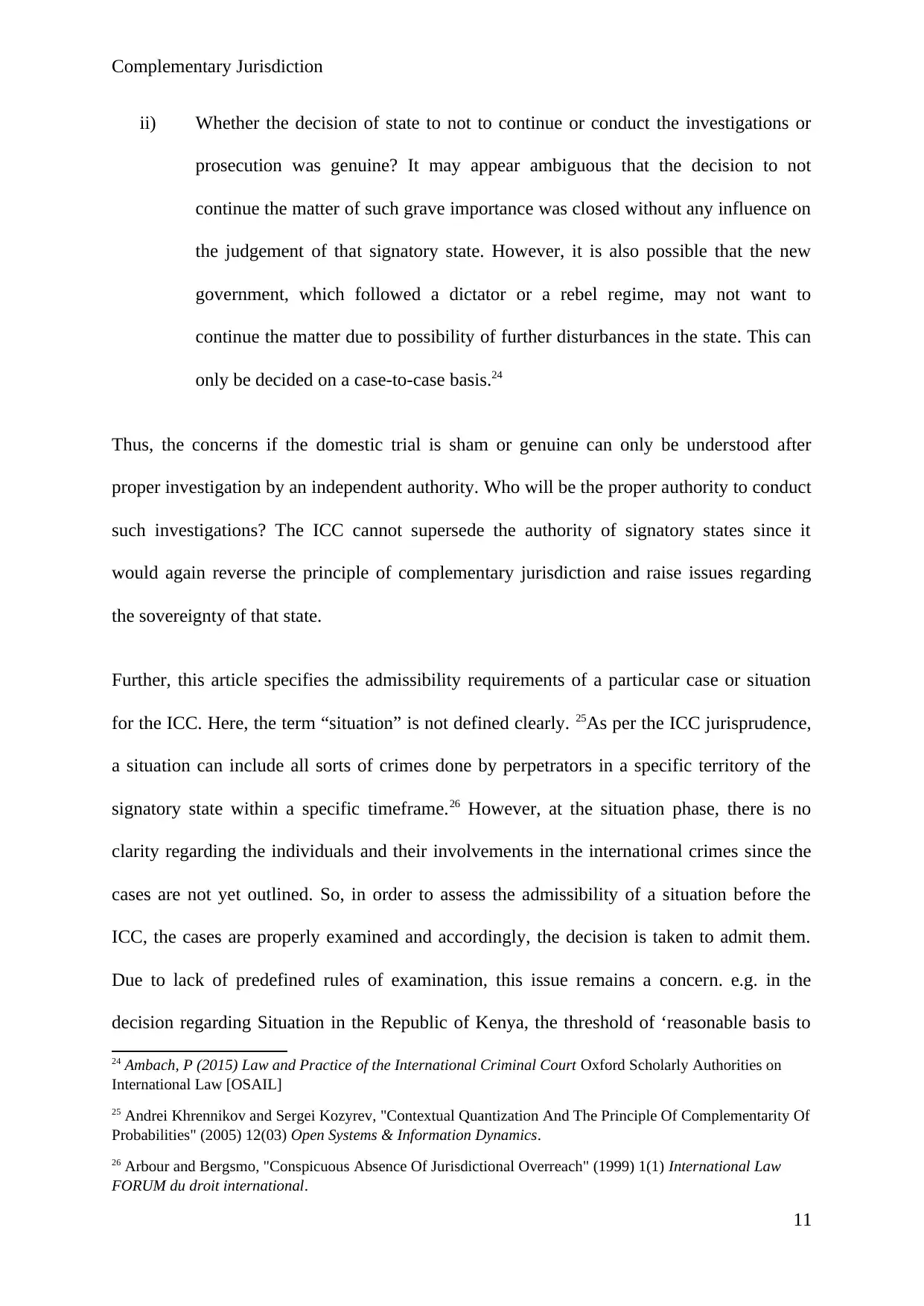
Complementary Jurisdiction
ii) Whether the decision of state to not to continue or conduct the investigations or
prosecution was genuine? It may appear ambiguous that the decision to not
continue the matter of such grave importance was closed without any influence on
the judgement of that signatory state. However, it is also possible that the new
government, which followed a dictator or a rebel regime, may not want to
continue the matter due to possibility of further disturbances in the state. This can
only be decided on a case-to-case basis.24
Thus, the concerns if the domestic trial is sham or genuine can only be understood after
proper investigation by an independent authority. Who will be the proper authority to conduct
such investigations? The ICC cannot supersede the authority of signatory states since it
would again reverse the principle of complementary jurisdiction and raise issues regarding
the sovereignty of that state.
Further, this article specifies the admissibility requirements of a particular case or situation
for the ICC. Here, the term “situation” is not defined clearly. 25As per the ICC jurisprudence,
a situation can include all sorts of crimes done by perpetrators in a specific territory of the
signatory state within a specific timeframe.26 However, at the situation phase, there is no
clarity regarding the individuals and their involvements in the international crimes since the
cases are not yet outlined. So, in order to assess the admissibility of a situation before the
ICC, the cases are properly examined and accordingly, the decision is taken to admit them.
Due to lack of predefined rules of examination, this issue remains a concern. e.g. in the
decision regarding Situation in the Republic of Kenya, the threshold of ‘reasonable basis to
24 Ambach, P (2015) Law and Practice of the International Criminal Court Oxford Scholarly Authorities on
International Law [OSAIL]
25 Andrei Khrennikov and Sergei Kozyrev, "Contextual Quantization And The Principle Of Complementarity Of
Probabilities" (2005) 12(03) Open Systems & Information Dynamics.
26 Arbour and Bergsmo, "Conspicuous Absence Of Jurisdictional Overreach" (1999) 1(1) International Law
FORUM du droit international.
11
ii) Whether the decision of state to not to continue or conduct the investigations or
prosecution was genuine? It may appear ambiguous that the decision to not
continue the matter of such grave importance was closed without any influence on
the judgement of that signatory state. However, it is also possible that the new
government, which followed a dictator or a rebel regime, may not want to
continue the matter due to possibility of further disturbances in the state. This can
only be decided on a case-to-case basis.24
Thus, the concerns if the domestic trial is sham or genuine can only be understood after
proper investigation by an independent authority. Who will be the proper authority to conduct
such investigations? The ICC cannot supersede the authority of signatory states since it
would again reverse the principle of complementary jurisdiction and raise issues regarding
the sovereignty of that state.
Further, this article specifies the admissibility requirements of a particular case or situation
for the ICC. Here, the term “situation” is not defined clearly. 25As per the ICC jurisprudence,
a situation can include all sorts of crimes done by perpetrators in a specific territory of the
signatory state within a specific timeframe.26 However, at the situation phase, there is no
clarity regarding the individuals and their involvements in the international crimes since the
cases are not yet outlined. So, in order to assess the admissibility of a situation before the
ICC, the cases are properly examined and accordingly, the decision is taken to admit them.
Due to lack of predefined rules of examination, this issue remains a concern. e.g. in the
decision regarding Situation in the Republic of Kenya, the threshold of ‘reasonable basis to
24 Ambach, P (2015) Law and Practice of the International Criminal Court Oxford Scholarly Authorities on
International Law [OSAIL]
25 Andrei Khrennikov and Sergei Kozyrev, "Contextual Quantization And The Principle Of Complementarity Of
Probabilities" (2005) 12(03) Open Systems & Information Dynamics.
26 Arbour and Bergsmo, "Conspicuous Absence Of Jurisdictional Overreach" (1999) 1(1) International Law
FORUM du droit international.
11
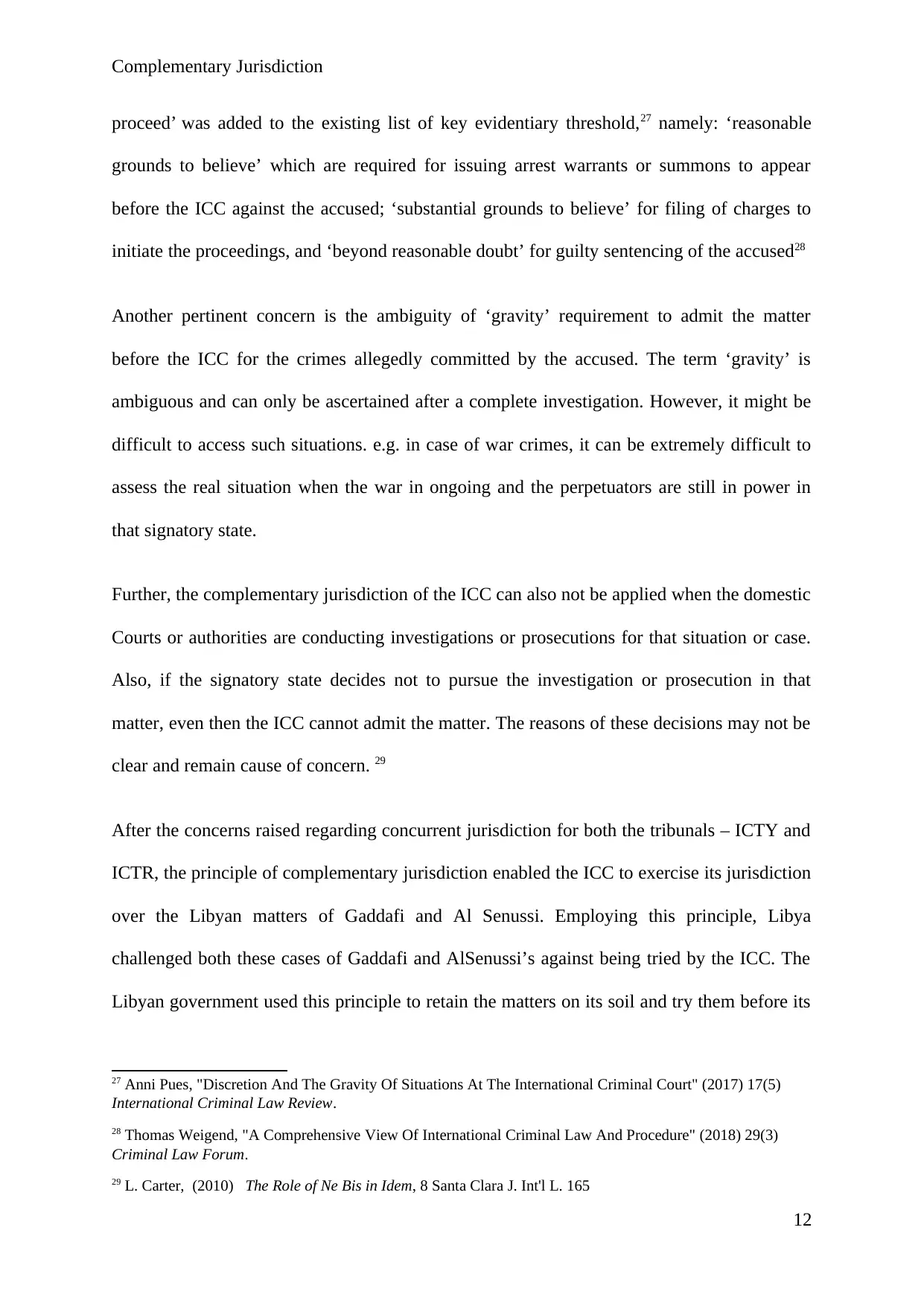
Complementary Jurisdiction
proceed’ was added to the existing list of key evidentiary threshold,27 namely: ‘reasonable
grounds to believe’ which are required for issuing arrest warrants or summons to appear
before the ICC against the accused; ‘substantial grounds to believe’ for filing of charges to
initiate the proceedings, and ‘beyond reasonable doubt’ for guilty sentencing of the accused28
Another pertinent concern is the ambiguity of ‘gravity’ requirement to admit the matter
before the ICC for the crimes allegedly committed by the accused. The term ‘gravity’ is
ambiguous and can only be ascertained after a complete investigation. However, it might be
difficult to access such situations. e.g. in case of war crimes, it can be extremely difficult to
assess the real situation when the war in ongoing and the perpetuators are still in power in
that signatory state.
Further, the complementary jurisdiction of the ICC can also not be applied when the domestic
Courts or authorities are conducting investigations or prosecutions for that situation or case.
Also, if the signatory state decides not to pursue the investigation or prosecution in that
matter, even then the ICC cannot admit the matter. The reasons of these decisions may not be
clear and remain cause of concern. 29
After the concerns raised regarding concurrent jurisdiction for both the tribunals – ICTY and
ICTR, the principle of complementary jurisdiction enabled the ICC to exercise its jurisdiction
over the Libyan matters of Gaddafi and Al Senussi. Employing this principle, Libya
challenged both these cases of Gaddafi and AlSenussi’s against being tried by the ICC. The
Libyan government used this principle to retain the matters on its soil and try them before its
27 Anni Pues, "Discretion And The Gravity Of Situations At The International Criminal Court" (2017) 17(5)
International Criminal Law Review.
28 Thomas Weigend, "A Comprehensive View Of International Criminal Law And Procedure" (2018) 29(3)
Criminal Law Forum.
29 L. Carter, (2010) The Role of Ne Bis in Idem, 8 Santa Clara J. Int'l L. 165
12
proceed’ was added to the existing list of key evidentiary threshold,27 namely: ‘reasonable
grounds to believe’ which are required for issuing arrest warrants or summons to appear
before the ICC against the accused; ‘substantial grounds to believe’ for filing of charges to
initiate the proceedings, and ‘beyond reasonable doubt’ for guilty sentencing of the accused28
Another pertinent concern is the ambiguity of ‘gravity’ requirement to admit the matter
before the ICC for the crimes allegedly committed by the accused. The term ‘gravity’ is
ambiguous and can only be ascertained after a complete investigation. However, it might be
difficult to access such situations. e.g. in case of war crimes, it can be extremely difficult to
assess the real situation when the war in ongoing and the perpetuators are still in power in
that signatory state.
Further, the complementary jurisdiction of the ICC can also not be applied when the domestic
Courts or authorities are conducting investigations or prosecutions for that situation or case.
Also, if the signatory state decides not to pursue the investigation or prosecution in that
matter, even then the ICC cannot admit the matter. The reasons of these decisions may not be
clear and remain cause of concern. 29
After the concerns raised regarding concurrent jurisdiction for both the tribunals – ICTY and
ICTR, the principle of complementary jurisdiction enabled the ICC to exercise its jurisdiction
over the Libyan matters of Gaddafi and Al Senussi. Employing this principle, Libya
challenged both these cases of Gaddafi and AlSenussi’s against being tried by the ICC. The
Libyan government used this principle to retain the matters on its soil and try them before its
27 Anni Pues, "Discretion And The Gravity Of Situations At The International Criminal Court" (2017) 17(5)
International Criminal Law Review.
28 Thomas Weigend, "A Comprehensive View Of International Criminal Law And Procedure" (2018) 29(3)
Criminal Law Forum.
29 L. Carter, (2010) The Role of Ne Bis in Idem, 8 Santa Clara J. Int'l L. 165
12
⊘ This is a preview!⊘
Do you want full access?
Subscribe today to unlock all pages.

Trusted by 1+ million students worldwide
1 out of 25
Related Documents
Your All-in-One AI-Powered Toolkit for Academic Success.
+13062052269
info@desklib.com
Available 24*7 on WhatsApp / Email
![[object Object]](/_next/static/media/star-bottom.7253800d.svg)
Unlock your academic potential
Copyright © 2020–2026 A2Z Services. All Rights Reserved. Developed and managed by ZUCOL.





